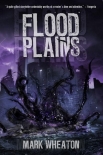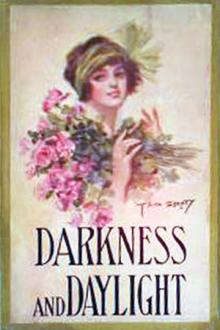Flood Plains by Mark Wheaton (best reads txt) 📗

- Author: Mark Wheaton
Book online «Flood Plains by Mark Wheaton (best reads txt) 📗». Author Mark Wheaton
“Shh,” he said a finger to his lips. “Don’t wake up Mom.”
Mia nodded, her bright, inquisitive eyes flashing, and grinned.
Alan smiled back and threw on the shirt, pocketing his key as he headed out the front door. He waved to Mia, but she’d already disappeared into her room.
It was a chilly morning, unusual for Texas in late September. With a storm rolling off the Gulf, though, all bets were off.
Alan jogged his warm-up lap through a park only a few blocks from the apartment. The dew of a cold morning always limited the number of human obstacles on the paths. North Houston had its share of crime, but it was nothing like down in the city. This park was about as safe as it got even at just past five in the morning. At one point, Alan had counted sixteen soccer fields, ten on one side of the street that bisected the park and six on the side he was running on now. He imagined the place was pretty packed on a Saturday morning.
Appearing out of the gloom were two middle-aged white men jogging together in slick running pants and tank tops.
“On your left,” Alan said like a cyclist, accelerating slightly.
“This is the guy,” he heard one the joggers say.
Alan grinned. The straightaway that ran along the northern fence began fifty yards in front of him. He slowed, glanced back to make sure the joggers were watching, and took off his watch, palming it. Coming to a complete stop, he took a couple of breaths of cold, damp air before dropping into starting position.
He felt the stretch in his calves as he arched his back. He placed his thumb on a button on the side of the watch, waited another second, and pushed it. The tiny beep it sounded was like a starter’s pistol to Alan. He rocketed forward, cutting through the still morning air like a rocket. He loved running in the damp, as the chill always drove him faster.
His legs pistoning up and down, Alan focused his eyes on the horizon. The tree that marked the finish line exactly eight hundred meters from where he started stayed in his peripheral vision, but he forced himself not to “run for the finish.” An 800-meter was about pacing, and seeing the finish could always spark an unexpected burst of unwanted adrenaline.
Instead, he cleared his mind, focused on his legs, and felt the air whipping past his body.
His thumb hit the button on the watch like a reflex the instant he passed the tree. As Alan decelerated, the joggers applauded and cheered, and he waved and smiled. He knew most people weren’t accustomed to see what they’d just seen. Everybody could run, but when they saw a real athlete at work, it was something they told their friends about.
Then Alan looked at his watch and found 1:59:44 staring back at him.
It could not have been worse. He angrily blanked the watch counter, but the time was already etched in his mind’s eye.
After a moment, he took off jogging again. His worry displaying itself in his stride, he knew that what he’d been considering for months couldn’t wait any longer.
• • •
“As Hurricane Eliza looms off the Gulf, the Astros leave for a swing through the Northeast with three games against the Mets, four, including a double-header, against Philly.”
Big Time had been in Texas for two years but still felt like a stranger. Even though Houston was just down the highway from New Orleans, he’d been raised to think of the Lone Star State as a land apart from what typically constituted “the South.” Louisiana, Mississippi, Alabama, Georgia: that was the South, with parts of the Florida panhandle making the cut on a good day. South Carolina? Nope. Tennessee or Kentucky or Arkansas? Not on your life. The South meant the states that lived and died by the whim of the Gulf of Mexico that created a temperate climate good for growing crops. It wasn’t where the hillbillies lived. It was where the wealthy could afford to keep slaves to work the land.
Big Time had never been one for genealogy but had always heard his relatives came in through Galveston instead of the Atlantic ports most slaves entered America through. He wondered if that was why his people never had much use for Texas.
A light rain fell as he drove Crosstimbers Avenue to the highway. The road was devoid of traffic this early, and his passage was witnessed only by the rows of crumbling wood frame houses on either side of the road. As if by design, the homes of Houston’s Fifth Ward all seemed to have yards overgrown with weeds and elm trees. Maintaining a shaggy outward appearance probably deterred at least a couple of would-be home invaders, at least more than the omnipresent waist-high chain link fences that encircled many properties. These were often so short a child could hop over without much difficulty.
For a district with such a reputation for hardcore violence, the tall grass, dirt sidewalks, and overhanging trees gave this part of Fifth Ward a positively rural appearance. It reminded Big Time of the neighborhood he’d grown up in. Even though Slidell was just on the east side of the Pontchartrain Bridge from New Orleans, it might as well have been on another planet.
Nearing the highway, Big Time jacked the windshield wipers up a notch as the rain came down harder. At the intersection of Crosstimbers and the entrance and exit ramps to the 59 Freeway, a two-story hotel that had been boarded up and painted a uniform white stood on his right and a Chevron gas station on his left. Realizing he would have to get gas at some point and the rain would only get worse as the hurricane got closer, Big Time pulled into the





Comments (0)